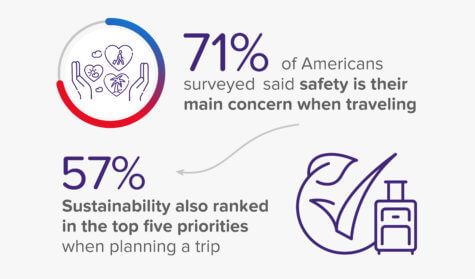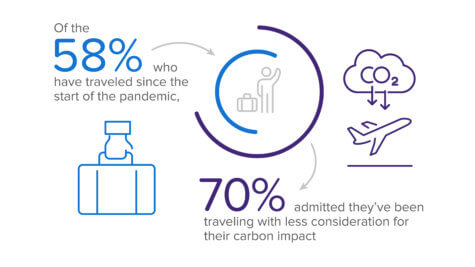
NEW YORK — Safety is on top of most travelers’ minds, but new research shows that safe travel habits may also come at the cost of the planet. A survey of 2,000 Americans asked respondents what aspects of travel are currently the most important to them, with safety topping the list at 71 percent.
Sustainability also ranked in the top five, with over half the poll (57%) saying it’s also an important factor when they’re planning a trip.
However, results found safe travel habits can overlap with unsustainable behaviors, posing the question: can travelers actually achieve those two objectives at the same time? Of the 58 percent who have traveled since the pandemic began, 70 percent admit they didn’t consider their carbon impact while on the road.
 For those Americans, many noted an increased reliance on single-use plastics and using more disposable masks (68%), followed by using more disposable gloves (58%), hand sanitizer (51%), and other cleaners (31%).
For those Americans, many noted an increased reliance on single-use plastics and using more disposable masks (68%), followed by using more disposable gloves (58%), hand sanitizer (51%), and other cleaners (31%).
Environmentally friendly travel
Commissioned by Cool Effect and conducted by OnePoll, the survey dug into how the pandemic may be changing travel moving forward – revealing some good news for Mother Nature.
While prioritizing environmentally friendly behaviors may seem more difficult these days, nearly 70 percent say the pandemic is making them more aware of how to travel sustainably. Another two in three people plan to use this knowledge to be more sustainable travelers in the future.
Some of their steps will be to take more sustainable modes of transportation (52%), travel to destinations with a reputation for their environmental consciousness and low carbon footprint (50%), eat or shop locally and use an eco-friendly booking site for accommodations (31%).
Workplaces going green
Companies are also taking action to save the planet. In fact, 36 percent of respondents report that their workplace is taking steps to actively reduce travel in its operations. Of those, 75 percent say their job requires fewer people to travel for in-person meetings.
Additionally, 71 percent note their employers have purchased carbon offsets and 54 percent report that their organizations only fly with specific airlines.
“Travel can have a large carbon footprint, but simple steps like packing lighter, reducing waste, choosing direct flights and choosing airlines that use biofuels can significantly lessen that impact,” says Jodi Manning, Cool Effect’s VP, director of marketing and partnerships, in a statement. “The last two years have shown us that virtual options can work. However, some travel is still necessary. Being aware of your emissions and actively taking steps to reduce them is what we call traveling better.”
4 in 5 people consider themselves eco-friendly
 When looking more broadly at climate change awareness and perceptions, the survey finds 78 percent consider themselves an environmentally friendly person. That compares to 71 percent in a similar survey run by Cool Effect and OnePoll last year. In this year’s survey, 75 percent say climate change is a daily concern in their life, on par with last year’s results (74%).
When looking more broadly at climate change awareness and perceptions, the survey finds 78 percent consider themselves an environmentally friendly person. That compares to 71 percent in a similar survey run by Cool Effect and OnePoll last year. In this year’s survey, 75 percent say climate change is a daily concern in their life, on par with last year’s results (74%).
There has been a slight increase (68%) in the number of people this year who feel knowledgeable about the actions they can take to help fight climate change (versus 63% last year). There still appears to be a gap when it comes to carbon offsets specifically. Of respondents who would not buy a carbon offset (or would not buy one again), they were unsure where the money would go (29%), while others didn’t know how purchasing an offset would help (27%) or were unsure exactly what it was (25%).
However, 74 percent believe carbon emissions are important in affecting climate change. While there are still barriers for purchasing offsets, over half the poll (58%) are familiar with carbon offsetting (versus 45% last year).
The results also show an increase in the number of respondents who have purchased an offset. In 2021, 57 percent of respondents said they have previously purchased a carbon offset, compared to 44 percent in last year’s survey.
